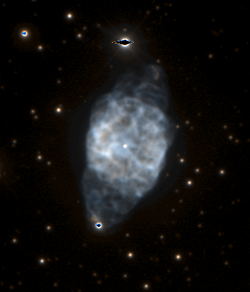NGC 6905
| Nebula | |
|---|---|
 Image based on observations made with ESO Telescopes at the La Silla Paranal Observatory | |
| Observation data: J2000 epoch | |
| Right ascension | 20h 22m 23s[1] |
| Declination | +20° 06′ 16″ [1] |
| Distance | 7.5 Kly (2.3 Kpc)[2] ly |
| Apparent magnitude (V) | 10.9[3] |
| Apparent dimensions (V) | 1′.2 |
| Constellation | Delphinus |
| Designations | Blue Flash Nebula[4] |
NGC 6905, also known as the Blue Flash Nebula, is a planetary nebula in the constellation Delphinus. It was discovered by William Herschel in 1784. The central star is 14.0 mag. The distance of the nebula, as with most planetary nebulae, is not well determined and estimates range between 1.7 and 2.6 kpc.[2]
The shape of NGC 6905 is characterised by an internal shell with angular dimentions 47" ×34" and roughly conical extentions, with ansae-type formations along the major axis. The nucleus of the nebula possesses one of the most broad emission of OVI emission lines among planetary nebulae.[5] Moreover, OVIII emission has been detected in NGC 6905.[6] The ansae were particullary intense in NII.[5] The central star, a white dwarf is estimated to have surface temperature 150.000 K.[2][7]
NGC 6905 can be detected under dark skies with a 4-inch telescope, but it better observed with larger instruments.[4]
References
- ^ a b "NGC 6905". simbad.u-strasbg.fr. Retrieved 25 January 2016.
- ^ a b c Keller, Graziela R.; Herald, James E.; Bianchi, Luciana; Maciel, Walter J.; Bohlin, Ralph C. (1 December 2011). "A new grid of synthetic spectra for the analysis of [WC]-type central stars of planetary nebulae". Monthly Notices of the Royal Astronomical Society. 418 (2): 705–728. doi:10.1111/j.1365-2966.2011.19085.x.
{{cite journal}}: CS1 maint: unflagged free DOI (link) - ^ "Revised NGC Data for NGC 6905". spider.seds.org.
- ^ a b "The Blue Flash (NGC 6905)". observing.skyhound.com. Retrieved 25 January 2016.
- ^ a b Cuesta, L.; Phillips, J. P.; Mampaso, A. (1993). "Spectroscopy and shock modelling of the unusual bipolar outflow NGC 6905" (PDF). Astronomy and Astrophysics. 266 (1): 199–212.
{{cite journal}}: CS1 maint: multiple names: authors list (link) - ^ Feibelman, Walter A. (1 January 1996). "The IUE Spectrum of the Planetary Nebula NGC 6905". The Astrophysical Journal. 472 (1): 294. doi:10.1086/178064. ISSN 0004-637X. Retrieved 25 January 2016.
- ^ Keller, G. R.; Bianchi, L.; Maciel, W. J. (11 June 2014). "UV spectral analysis of very hot H-deficient [WCE]-type central stars of planetary nebulae: NGC 2867, NGC 5189, NGC 6905, Pb 6 and Sand 3". Monthly Notices of the Royal Astronomical Society. 442 (2): 1379–1395. doi:10.1093/mnras/stu878.
{{cite journal}}: CS1 maint: unflagged free DOI (link)
